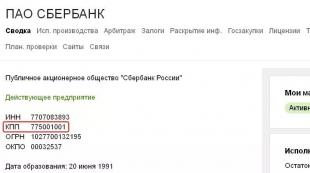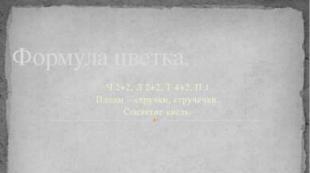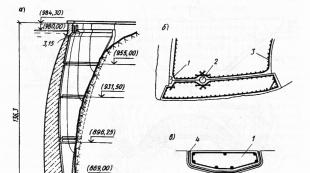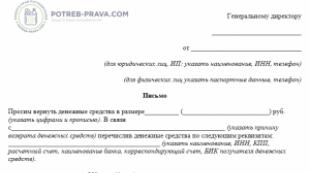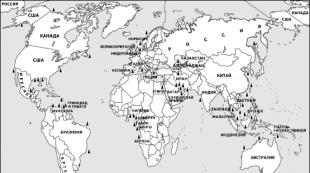An approximate daily routine for patients in a therapeutic department and the job responsibilities of a junior nurse in caring for patients. Responsibilities of a nurse in caring for patients Job description of a junior ward nurse
Many people do not know what rights and responsibilities a nurse has. On the basis of what regulatory document does this specialist carry out his work?
A nurse is the main assistant to doctors. The rights and responsibilities of a nurse should be based on willingness to help and respect for other people. Your actions should be directed towards care, assistance in rehabilitation, and health promotion. In addition, care must be taken to ensure that other diseases do not appear in the future. The nurse must be present at doctors' appointments in the following hospital rooms: dental, therapeutic, children's, surgical, operating room, procedure room, anesthetist, reception room, intensive care unit.
It is imperative to observe the norms of normal communication with patients.
A nurse can begin to occupy her position and be released from it on the basis of an order issued by the head of a medical organization.
The specialist must obey:
- head nurse;
- head of the department.
Junior staff of a medical institution include:
- nurse;
- sister-hostess;
- a nurse who provides general ward care to patients.
 To be able to occupy this position, you must obtain an education in the field of health care with a specialty in nursing. Secondary level education. The position of a nurse is included in the class - specialist. In cases where a nurse needs to be absent from the workplace (for example, due to illness), rights and responsibilities are transferred to the appropriate specialist. To transfer rights and obligations, it is necessary to prepare an order by the management of the organization. It is imperative that a specialist holding the position of nurse must know the norms of legislative acts that regulate relations in the field of health care. It is also necessary to know the document containing the composition and hierarchy of the departments of the medical institution. In addition, you should familiarize yourself with the materials that contain a list of measures and means that can prevent workers from being exposed to hazardous factors. When carrying out her work activities, a nurse must be based on the Constitution of the Russian Federation, the laws of Russia, the Charter of the institution, and the Job Description.
To be able to occupy this position, you must obtain an education in the field of health care with a specialty in nursing. Secondary level education. The position of a nurse is included in the class - specialist. In cases where a nurse needs to be absent from the workplace (for example, due to illness), rights and responsibilities are transferred to the appropriate specialist. To transfer rights and obligations, it is necessary to prepare an order by the management of the organization. It is imperative that a specialist holding the position of nurse must know the norms of legislative acts that regulate relations in the field of health care. It is also necessary to know the document containing the composition and hierarchy of the departments of the medical institution. In addition, you should familiarize yourself with the materials that contain a list of measures and means that can prevent workers from being exposed to hazardous factors. When carrying out her work activities, a nurse must be based on the Constitution of the Russian Federation, the laws of Russia, the Charter of the institution, and the Job Description.
Nurse's rights
The duties and responsibilities of the junior nurse are provided for in the Job Description.
The rights of a nurse include:
- To perform your duties, expect to receive information that may be required for this.
- In order to improve the activities of medical staff, express your opinion and make your suggestions.
- Demand from superior officials that the workplace be equipped with everything necessary to properly perform their duties.
- Attend courses to improve your skills. Pass recertification to obtain the highest qualification categories.
- Take part in the activities of nursing associations. Moreover, such work should not be prohibited by Russian law.
When performing their duties in the surgical department, in addition to the listed rights, there are other rights of the junior nurse. For example, monitoring the antiseptic level at the time of surgery.
Responsibilities of junior and senior nurses
The Job Description describes the responsibilities of junior and senior nursing staff.

In accordance with this regulatory document, in practice the list of responsibilities includes:
- Carrying out assessment activities to determine the patient's condition.
- Making a care plan.
- Performing functional procedures for treatment and prevention that were prescribed by a doctor.
- Performing auxiliary actions when the doctor performs operations and medical manipulations. These actions can be carried out in an outpatient clinic or in a hospital.
- Creating conditions for carrying out medical prescriptions.
- Providing assistance until the doctor appears. This duty is fulfilled when the disease is acute or a disaster occurs.
- Ensuring the safety of medicines. She must also keep records, and if the validity period expires, take steps to write off the drugs.
- Conduct accounting and reporting work. The procedure and rules are established by legislative acts and hospital management.
- Administration of medications. This must be done in accordance with the doctor's orders and the established procedure for necessary actions, based on the patient's condition.
- If complications in the patient’s health condition are detected during the doctor’s absence. This may be due to the medications that were prescribed for treatment.
- Collect and dispose of waste from medicines.
- Carry out physical therapy.
- Sterilize medical instruments.
- Ensure hygienic conditions in the premises of the medical institution.
The responsibilities of the senior nurse also include monitoring the performance of their duties by junior medical staff.
Nurses' responsibilities
In certain cases, the nurse may be held liable. Such cases include failure to perform, as well as untimely fulfillment of the duties assigned to her by the Job Description. If a specialist is negligent in his duties, he may be held liable. In addition, liability arises when a specialist does not comply with the standards of the Job Description and other documents in force on the territory of the medical institution.
The nurse should not violate the following rules:
- labor discipline;
- fire safety;
- labor regime;
- safety precautions.
Violations are qualified according to the civil, administrative and criminal legislation of the Russian Federation. In cases where medical staff, through their violations, caused material damage to the employer, they may be held accountable within the limits of civil and labor legislation.
Examples from judicial practice
The head physician of the medical institution reprimanded the nurse by signing an order. This decision was based on the fact that during the preparation of the annual report, the woman remained at work after the end of the working day. When she left, she closed the office and department. The woman did not pay attention to the fact that the patient remained in the department. The man was unable to get out and called for help. The aggravation of the situation was due to the fact that he needed to be at his workplace on time (he was starting a night shift), and at the hospital he wanted to get a certificate. The man filed a complaint. After receiving a reprimand, the nurse went to court. Having considered the case, the judge made a decision to satisfy the stated requirements. In his decision, he was based on the lack of duties of the nurse to inspect the hospital grounds.
The junior nurse belongs to the junior medical staff. Her responsibilities include caring for patients, maintaining cleanliness in the wards, delivering tests to the laboratory and much more.
General provisions
The position of junior nurse appeared relatively recently. Nurses are gradually being removed from the staff of medical institutions, and are being replaced by junior nurses to care for patients. Thus, this specialist practically plays the role of a nurse with somewhat expanded functions.
A junior nurse does not have to graduate from a medical college or technical school. Some hospitals accept this position without any experience or education requirements, but sometimes a certificate of completion of special courses may be required.
Junior nurses work in all areas of medicine: in surgical and therapeutic hospitals, in the field of psychiatry, in emergency rooms, etc.
IMPORTANT! Nursing assistants often deal with patients who are in serious condition and unable to care for themselves. Therefore, a specialist must have patience and compassion.
Labor functions
The junior nurse must perform the following functions:
- care for the sick (change underwear and bed linen, wash patients, feed them, change diapers and serve a bedpan, etc.);
- transport patients to diagnostic and other departments;
- clean the wards;
- provide assistance to doctors and other nurses in the implementation of diagnostic and treatment measures;
- process instruments, care items and dishes of patients in accordance with the rules of asepsis and antisepsis.
IMPORTANT! College of nursing students can become certified as a nurse in patient care after completing their first year by passing the Fundamentals of Nursing exam. You can also study to become a younger sister through courses that usually operate at large medical institutions. The duration of the courses is 2-3 months.
Job responsibilities
The responsibilities of the junior nurse are as follows:
- monitor the cleanliness of the chambers entrusted to her;
- monitor patient comfort;
- follow the rules of antiseptics and asepsis;
- carry out simple medical procedures (applying compresses, applying simple dressings, etc.);
- transport seriously ill patients;
- accompany patients to diagnostic procedures and to other departments of the medical institution.
Rights

The junior nurse has the right:
- report to management about violations of production and labor discipline by other employees;
- request information from management regarding the performance of her immediate job duties;
- timely get acquainted with the projects regulating her work activities;
- demand assistance in performing their duties, for example, request assistance in providing the necessary personal protective equipment.
Responsibility
The junior nurse is responsible for:
- for the proper performance of their official duties;
- for offenses committed in the course of professional activities;
- for causing material damage to the employer.
Features of the functional responsibilities of a junior nurse in psychiatry
Psychiatric departments have certain specifics, which affect the characteristics of the work of medical personnel. Patients receiving treatment in a psychiatric hospital do not realize that they are sick and do not evaluate their condition critically. They can become agitated and show aggression, presenting a danger to medical personnel at such moments.

A nurse who works in a psychiatric hospital must not only be patient, but also vigilant: if the patient shows the first signs of aggression, he should immediately inform the doctor and ensure his own safety.
You should avoid wearing bright cosmetics and jewelry. You cannot enter the department with your hair down and not hidden under a cap. This is due to the fact that patients may be sexually disinhibited: under no circumstances should you attract their attention.
The procedure for approving a job description for a junior nurse
The job description for a nurse is developed by the management of the medical institution and approved by the chief physician and senior nurse of the department.
When applying for a job, an employee must read the instructions and ask all his questions regarding the specifics of performing his job duties. Junior and mid-level medical staff have the right to demand changes in instructions if this will help improve the quality of work. After submitting a proposal, it will be considered by the management of the medical institution.
Final provisions
If the functional duties of a junior nurse in caring for patients are performed improperly, which entails consequences for the life and health of the patient, she may be brought to administrative or even criminal liability. Therefore, junior staff must understand both the legislation relating to the regulation of relations in the field of healthcare and the basics of medical knowledge.
The nurse should know:
- first aid rules;
- rules for caring for seriously ill patients who are unable to self-care;
- rules for transporting patients on stretchers and gurneys;
- simple medical procedures;
- rules of sanitation and hygiene.

In her work, a nurse must comply with the principles of medical ethics. It is important to remember that people suffering from serious illnesses suffer not only from their physical condition, but also from the inability to care for themselves. It is necessary to spare their feelings and prevent humiliation of human dignity: a number of manipulations (giving a vessel, changing a colostomy bag) must be performed without witnesses. The junior nurse must explain to the patient the meaning of each manipulation performed and its significance, establish psychological contact, and find out whether the patient is experiencing discomfort.
IMPORTANT! All medical staff must be proficient in the technique of providing first aid. The auxiliary nurse has the right (and responsibility) to perform resuscitation measures, for example, cardiopulmonary resuscitation.
The rights, duties and responsibilities of a nurse, which are described in this article, may seem quite simple. However, junior staff are more likely than other hospital staff to be in close contact with patients. And the psychological state of patients, and therefore their faith in a successful outcome of the disease, often depends on the sensitivity, attention and kindness of junior care nurses.
1. This job description defines the functional duties, rights and responsibilities of a junior nurse in caring for patients.
2. A person who has primary vocational education in the specialty “Nursing” without requirements for work experience or secondary (complete) general education, additional training in the field of professional activity without requirements for work experience is appointed to the position of junior nurse for patient care. .
3. A junior nursing nurse should know: techniques for performing simple medical procedures; rules of sanitation and hygiene, patient care; rules for collection, storage and disposal of healthcare facility waste; internal labor regulations; labor protection and fire safety rules.
4. A junior nurse for patient care is appointed and dismissed by order of the head of the organization in accordance with the current legislation of the Russian Federation.
5. The junior nurse for patient care is directly subordinate to the head of his structural unit (head of the department) or the senior nurse.
2. Job responsibilities
Provides patient care assistance under the direction of a nurse. Performs simple medical procedures (placement of cups, mustard plasters, compresses). Ensures that patients and premises are kept clean. Ensures proper use and storage of patient care items. Changes bed and underwear. Participates in the transportation of seriously ill patients. Monitors compliance by patients and visitors with the internal regulations of the medical organization. Carries out the collection and disposal of medical waste. Carries out measures to comply with the rules of asepsis and antisepsis, conditions for sterilization of instruments and materials, and the prevention of post-injection complications, hepatitis, and HIV infection.
3. Rights
A junior nurse caring for patients has the right:
- make proposals to management regarding the organization and conditions of their work activities;
- use information materials and regulatory documents necessary to perform their official duties;
- undergo certification in the prescribed manner with the right to receive the appropriate qualification category;
- improve your skills.
A junior nurse caring for patients enjoys all labor rights in accordance with the Labor Code of the Russian Federation.
4. Responsibility
The junior nursing assistant is responsible for:
- timely and high-quality implementation of the duties assigned to her;
- timely and qualified execution of orders, instructions and instructions from management, regulations on its activities;
- compliance with internal regulations, fire safety and safety regulations;
- maintaining documentation provided for by current regulations;
- promptly taking measures, including timely informing management, to eliminate violations of safety regulations, fire safety and other rules that pose a threat to the activities of the organization, its employees and other persons.
For violation of labor discipline, legislative and regulatory acts, a junior nurse caring for patients may be subject to disciplinary, material, administrative and criminal liability in accordance with current legislation, depending on the severity of the offense.
"Medical statistics and organizational methods work in
healthcare institutions", 2013, N 12
Organizers of nursing staff activities face some typical problems. They are related to the correct names of the positions of cleaners, nurses and nursing assistants, the definition of their job responsibilities and work standards, as well as the organization of their training. This article is devoted to the analysis of these problems.
Job titles for junior medical personnel
Medical workers, according to Art. 350 of the Labor Code of the Russian Federation, have the right to a shortened working week: it, taking into account the reduction of 30 minutes on Saturday, should not exceed 38.5 hours. Does this right apply to nurses and cleaners of healthcare institutions?
Since this right concerns medical workers, it is necessary to find out whether nurses and cleaners are medical workers? The answer to the question should be sought in the nomenclature of the positions of medical workers. Thus, in accordance with the nomenclature of positions for medical workers and pharmaceutical workers<*>Junior medical personnel include:
- junior nurse for patient care;
- orderly;
- nurse driver;
- sister-hostess.
As you can see, the nomenclature includes the position of a nurse, i.e. she is a medical professional, and there is no position of a cleaner, who, therefore, is not a medical professional. The conclusion is clear: nurses have the right to a shortened working week, but cleaners do not.
The situation is less certain when it comes to a barmaid or bath attendant, since these positions are not included in the list of medical workers. However, in the event of a conflict with the inspection authorities, you can refer to the orders on staffing standards that have not yet been canceled, where these positions are named. However, success is not guaranteed.
The issue arises even more acutely when it comes to the assignment of preferential pensions to nursing assistants and barmaids in infectious diseases and anti-tuberculosis institutions. Let us give an example of such a court case.
Dispute over early retirement
When determining the employee’s right to early retirement, the Pension Fund of the Russian Federation refused to include in the length of service giving the right to early retirement the 10 years that she worked as a nurse-barmaid in a tuberculosis department. As a result, she did not have enough preferential service and was denied early retirement. The woman filed a lawsuit. In support of her claim, she noted that while working as a barmaid, she cared for the patients of this department, organized the distribution of food, fed the sick, and cleaned the dining room and pantry. The plaintiff combined her position with the work of a ward nurse in the tuberculosis department. The work was carried out in contact with patients.
The representative of the Pension Fund did not admit the claim in court, citing the validity of the refusal to grant a pension due to insufficient special experience. The nomenclature of positions for medical workers, as well as the list of positions for health workers who are entitled to early retirement, do not contain the position of “nurse-barmaid”. The employee also did not provide the Pension Fund with a job description that would indicate her responsibility to care for the sick.
The representative of the hospital where the plaintiff worked considered the stated demands to be justified and subject to satisfaction, since her work was carried out in contact with patients.
The court took into account Instructions of the Ministry of Health of Russia dated April 26, 1993 No. 1-31-U “On the procedure for applying Section XXIV of List No. 2 of production, work, professions, positions and indicators that give the right to preferential pension provision,” which states that when resolving issues related to the assignment of preferential pensions to nursing and junior medical personnel directly serving patients, according to List No. 2, Section XXIV, one should be guided by the following: “Direct patient care” is work that is carried out in the conditions of contact between a medical worker and a patient. Carrying out a number of diagnostic and treatment procedures, measures for patient care, and the creation of an appropriate medical and protective regime require direct contact between staff and patients." Also, these Instructions of the Ministry of Health provide approximate lists of types of activities of junior staff related to the direct care of patients, which in particular includes washing dishes, distributing food, feeding the sick and approximate lists of junior staff positions related to direct care of patients. However, the position of a nurse-barmaid is not on this list. But, as stated in the Directions, the given list is approximate and the final decision on determining the list of jobs. and positions whose employees are entitled to preferential pension benefits remains with the administration, which confirms the nature of the work and brings it to the attention of the employees. The court examined the nature of the plaintiff’s work as a barmaid, interviewed witnesses and found out that she was engaged in direct work with patients. She was in direct contact with the patients, fed them, cleared the dishes, and also had to wash, cut, and change bedding for patients in the tuberculosis department.
Taking into account the above, the court decided that the absence of the plaintiff’s job description indicating direct care of patients in the tuberculosis department does not affect the factual and legal essence of her medical activities and her right to early retirement. The personal invoices submitted to the court, which indicate a 25% bonus to wages for harmful work at the main place of work, as well as a certificate of the number of shifts and hours worked, confirm the plaintiff’s work on a full-time basis and shifts in the tuberculosis department. The court upheld the claim and ordered the Pension Fund to include in the plaintiff’s special experience the period of work as a nurse-barmaid in a tuberculosis department.
Thus, when determining an employee’s right to a preferential pension, the Pension Fund, first of all, checks whether the position held by the employee is in the nomenclature of positions for medical workers and in List No. 2, which lists the positions of employees entitled to benefits. The current nomenclature of positions does not provide for the position of a nurse-barmaid. She is also not on List No. 2. Further, the Fund’s employees usually do not understand and refuse a preferential pension on formal grounds. On this basis, a pension was also denied to the barmaid from the tuberculosis department.
Consequently, in order to ensure the right of barmaid nurses in anti-tuberculosis and infectious diseases hospitals to early retirement, it is necessary to rename the position of barmaid nurse to the position of nurse, of which the employee should be notified in writing at least 2 months in advance. Otherwise, due to the incorrect title of the position, the nurse-barmaid will have to prove her right to be included in the work experience that gives the right to a preferential (according to List No. 2) pension through the court.
Qualification characteristics for positions of junior medical personnel
Having learned that the young nurse in the surgical department was good at using a computer, the head of the department ordered her to type discharge summaries into the computer during her free time from cleaning. Is this legal?
Disputes often arise in work collectives about whether it is possible to oblige an employee to perform this or that work. The qualification characteristics of the employee’s position can help you figure this out. The labor functions he performs must correspond to his qualifications. Let's consider the qualification characteristics for junior medical staff positions.
Qualification characteristics of positions of junior medical and pharmaceutical personnel<*>
<*>Approved by order of the Ministry of Health and Social Development of the Russian Federation dated July 23, 2010 N 541n “On approval of the Unified Qualification Directory of Positions of Managers, Specialists and Employees.”Junior nursing nurse
Job responsibilities. Provides patient care assistance under the direction of a nurse. Performs simple medical procedures (placement of cups, mustard plasters, compresses). Ensures that patients and premises are kept clean. Ensures proper use and storage of patient care items. Changes bed and underwear. Participates in the transportation of seriously ill patients. Monitors compliance by patients and visitors with the internal regulations of the medical organization. Carries out the collection and disposal of medical waste. Carries out measures to comply with the rules of asepsis and antisepsis, conditions for sterilization of instruments and materials, and the prevention of post-injection complications, hepatitis, and HIV infection.
Must know: techniques for performing simple medical procedures; rules of sanitation and hygiene, patient care; rules for the collection, storage and disposal of waste from medical institutions; internal labor regulations; labor protection and fire safety rules.
Qualification requirements. Primary vocational education in the specialty "Nursing" without requirements for work experience or secondary (complete) general education, additional training in the field of professional activity without requirements for work experience.
Sister-hostess
Job responsibilities. Supervises the work of nurses and cleaners in keeping the premises of a medical organization (unit) clean and in order, provides the serviced unit with household equipment, special clothing, hygiene items, office supplies, detergents, bed and underwear for patients. Changes gowns and towels for employees of medical organizations. Draws up requests for repairs of premises, equipment, inventory and monitors its implementation. Provides food units (buffet, canteen) with equipment, utensils and ensures their correct labeling and use. Maintains accounting and reporting documentation.
Must know: expiration dates of linen and equipment used in a medical organization (unit); methods of sanitizing equipment; conditions of operation and storage of equipment; forms of accounting and reporting documentation and rules for filling them out; rules for observing the sanitary and hygienic regime in a medical organization (unit); internal labor regulations; labor protection and fire safety rules.
Qualification requirements. Secondary (complete) general education and additional training in the field of professional activity without presenting requirements for work experience.
Nurse
Job responsibilities. Cleans premises in a medical organization. Assists the senior nurse in obtaining medications, instruments, equipment and delivering them to the department. Receives from the housewife and ensures proper storage and use of linen, household equipment, dishes and detergents. Cleans bedside tables for bedridden patients after each meal. At the direction of the ward nurse, she accompanies patients to diagnostic and treatment rooms. Acts as a courier and washes pharmaceutical glassware. Informs the sister-housewife about malfunctions in the heating system, water supply, sewerage and electrical appliances. Prepares rooms and baths. Systematically (after each patient) carries out sanitary and hygienic treatment of the bathtub and washcloths. Assists patients in taking a hygienic bath, undressing and dressing. In the absence of a junior nurse, he receives underwear and bed linen from the housewife and changes it. Receives ready-made food at the catering unit, checks it by weight and count. Signs the handout sheet. Heats food. Distributes hot food to patients according to the menu and prescribed diet. Washing dishes, cleaning the pantry and dining room, observing sanitary requirements. Systematically cleans refrigerators intended for storing sick food. Provides sanitary and hygienic maintenance of the pantry and dining room. Promptly informs department management about the need to repair pantry equipment and inventory.
Must know: rules of sanitation and occupational hygiene; purpose of detergents and rules for handling them; internal labor regulations; labor protection and fire safety rules.
Qualification requirements. Secondary (complete) general education without any work experience requirements.
As you can see, there are no requirements in the qualifications of a nurse to be able to work with medical documentation and have computer skills. This means that no one has the right to charge her with the responsibility of printing discharge summaries.
Job Descriptions
Nurses at the reception department were required to perform courier functions. Nurses from the intensive care unit were involved in transporting the corpses to the morgue. Is this legal?
The labor responsibilities of each employee are determined by his job descriptions. It is necessary to firmly understand that there are no uniform job descriptions for all nurses or junior nursing assistants in our country, and there cannot be. They are compiled in each health care facility and for each workplace individually. It all depends on the specific working conditions. So, in one office, the duties of a nurse may include performing courier functions, for example, delivering samples for research in a laboratory, but in another - not. The job descriptions must also indicate whose instructions the employee must follow, and who is obliged to provide him with the information necessary for the job. Let us give an example of a current job description for a nursing nurse in the intensive care unit of one of the large departmental hospitals.
Job description of a junior nurse for care
- General provisions
1.1. A person with at least an incomplete secondary education and who has completed courses for junior nurses in patient care is appointed to the position of junior nurse for patient care. Specific on-the-job training must also be provided upon entry into the position.
1.2. A junior nurse for patient care is appointed to a position and dismissed from a position on the basis of an order from the chief physician on the recommendation of the head of the department and the head nurse.
1.3. The junior nursing nurse in her work reports to the senior nurse of the department, the ward nurse.
1.4. In her work, the junior nurse for patient care is guided by the regulations on the department of anesthesiology and resuscitation and the department of resuscitation and intensive care, the internal labor regulations of the department, and this job description.
- The junior nurse for patient care is obliged to:
2.1. Assist the ward nurse in caring for patients (feeding, washing and cleaning patients);
2.2. Ensure that patients are kept clean and tidy, for which purpose timely re-making the patients' beds, carrying out sanitary and hygienic measures for the care of patients (removing bedpans, trays and then treating them with disinfectants);
2.3. Systematically carry out wet cleaning, ventilation, and wards. To clean the wards, she must have the necessary equipment and devices;
2.4. Monitor compliance with the sanitary-epidemiological regime and safety regulations;
2.5. Participate in shifting and transporting patients;
2.6. Participate in rearranging corpses for delivery to the morgue;
2.7. Provide assistance in the delivery of linen, equipment and other property, deliver food and feed the sick;
2.8. Follow fire safety rules. In the event of a fire in the department, take part in the evacuation of patients, property and equipment.
- A junior nurse caring for patients has the right:
3.1. Demand from the administration of the department the required quantity of good-quality equipment for cleaning wards, caring for patients, and means of small-scale mechanization;
3.2. Make proposals to the department administration to improve the organization of working conditions;
3.3. Participate in basic plumbing classes for junior staff;
3.4. Inform the sister-owner of the department about all malfunctions of the heating, lighting and other systems.
- The junior nursing assistant is responsible for:
4.1. Accurate and timely fulfillment of duties provided for in this job description and the internal labor regulations of the department.
Let us pay attention to paragraph 2.6. on the transportation of corpses - its inclusion in the job description is explained by the peculiarities of the work of the intensive care unit. Let us also draw attention to the mandatory participation of nurses in training as part of the plumbing minimum for junior medical staff. The instructions do not indicate how to perform courier duties. This is neither good nor bad - it simply reflects the situation in the specific department for which this instruction was compiled. At the same time, I would like to draw attention to one drawback of the given instructions: it does not define the responsibility of the care nurse to inform the ward nurse or doctor about changes she has noticed in the patient’s condition, for example, about the appearance of an inadequate reaction to her treatment.
Professional standards for junior medical staff positions
Drawing up job descriptions for different groups of personnel is often difficult. Therefore, many managers prefer to use a variety of collections of ready-made instructions, despite the fact that they do not always correspond to the established practice in their health care facilities. Where to look for help?
We invite the reader to turn for help to the draft professional standards for the positions of mid-level and junior medical staff. Currently, large-scale work is underway in the country to draw up professional standards for all sectors of the national economy, including for healthcare workers. In particular, draft professional standards for positions of junior and nursing staff were developed by the Russian Association of Nurses. By now, the period for their discussion by the nursing community has ended. Their approval is awaited.
Professional standards will contain requirements for the content and working conditions, qualifications and competencies of medical personnel. They will list the main job functions for each position, job actions for each function and a list of knowledge, skills and abilities necessary to perform these actions.
Let us give an example of how the draft formulates the main labor functions of a nurse and other junior medical staff. It is these lists of job functions that, first of all, can come to the rescue when it is not possible to find suitable wording when developing job descriptions.
Labor functions of a nurse
- Carrying out hygiene procedures for patients;
- cleaning the wards;
- sanitary maintenance of wards;
- cleaning offices and surgical departments;
- performing auxiliary sanitary work in offices and surgical departments;
- disposal of medical waste.
Unlike a nurse, the draft standard for a cleaner only includes:
- cleaning common areas in health care facilities;
- cleaning sanitary facilities and toilet rooms in health care facilities;
- collection, temporary storage and transportation of waste to health care facilities.
A care nurse has a wider range of job functions compared to a nurse:
- general medical care for patients with poor self-care;
- maintaining a protective treatment regime in health care facilities;
- maintaining infectious safety of the hospital environment;
- determination of insufficiency (deficit) of self-care in patients;
- transportation, support and movement of patients;
- general hygienic care for patients with insufficient self-care;
- feeding patients with limited personal care capabilities;
- performing simple medical nursing procedures;
- provision of benefits and care for physiological functions;
- provision of first aid;
- general medical care for the dying;
- health education and patient/family training in general caregiving skills.
Thus, the professional standard first defines labor functions by position. Next, for each labor function, a detailed breakdown of the labor actions that must be performed to implement it is given. For example, when carrying out hygienic procedures for patients, a nurse, according to the draft standard, must perform the following actions:
- obtaining medical information about the volume of sanitary treatment of the patient;
- coordination of the volume and type of work with the nurse;
- receiving linen, detergents and cleaning products, and household equipment from the sister-housewife;
- preparing the bathroom for hygiene procedures;
- providing the patient with soap, towels, a set of clean underwear, pajamas, and slippers;
- carrying out special sanitary treatment of the patient in the emergency department in accordance with the doctor’s prescription;
- accompanying (transporting) the patient to the ward after a hygienic bath (shower);
- informing the patient about the possibility of staying in hospitals in home clothes and using personal hygiene items;
- sending the patient’s personal clothes and shoes for storage or transferring them to his relatives (acquaintances) for storage;
- sending personal clothing of patients with infectious diseases for chamber disinfection in the prescribed manner;
- carrying out routine hygienic treatment of patients;
- providing assistance with physiological functions to patients with insufficient self-care;
- cleaning, maintaining sanitary condition and order in the bathroom;
- collection of dirty hospital linen;
- transfer of dirty linen to the central linen room;
- compliance with labor protection and fire safety;
- providing first aid in emergency situations, injuries, accidental poisonings, and accidents.
And finally, the draft standard reveals what knowledge, skills and abilities workers must have in order to perform the necessary work actions. So, in order to carry out the listed actions to perform hygiene procedures, a nurse must be able to:
- ensure communication is based on respect for others;
- comply with internal regulations, medical and protective regime of health care facilities;
- prepare and ensure storage of a hospital set of clean underwear, pajamas, and slippers for patients;
- use special clothing and personal protective equipment;
- carry out hand disinfection according to the instructions/algorithm;
- carry out sanitary treatment of the patient as prescribed by the doctor in accordance with technology standards;
- provide assistance in showering, bathing or wet wiping, cutting nails and other hygiene procedures for patients with insufficient self-care;
- use a special gurney to carry out hygiene procedures for the patient;
- carry out all types of bathroom cleaning in accordance with regulatory documents;
- escort the patient from the bathroom to the ward;
- collect, sort and remove dirty linen in the prescribed manner;
- provide first aid in case of injuries, poisoning, accidents;
- observe labor protection and fire safety measures, use fire extinguishing equipment;
- adjust one’s own activities based on the decisions of the manager and the work team.
In addition, in order to perform the necessary professional actions on patient hygiene, according to the draft standard, a nurse must know:
- professional standard requirements and job responsibilities;
- rules of conflict-free behavior when communicating with patients and employees, environment
- fundamentals of legislation on protecting the health of citizens;
- legal support for the activities of junior medical staff of health care facilities;
- medical and protective regime of health care facilities;
- requirements for the rules of personal hygiene of patients and medical staff of a medical institution in accordance with regulatory documents;
- the procedure for storing the patient’s personal clothing and shoes in health care facilities;
- the procedure for sending personal clothing of patients with infectious diseases for chamber disinfection;
- sanitary rules and standards for the maintenance of premises, equipment, and inventory in health care facilities;
- standard measures to ensure infection safety of patients and staff;
- methods, techniques and means of ergonomic movement of patients and heavy objects;
- the physiological needs of the patient and their violations, the degree of insufficiency of self-care;
- technology standards (algorithms) for patient sanitization and hygienic care;
- technology standards (algorithms) for providing benefits for physiological functions to patients with insufficient self-care;
- rules and regulations of labor protection, fire safety, equipment operation;
- first aid algorithms for emergencies, injuries, accidental poisonings, and accidents.
According to a similar plan, the draft standard describes the remaining labor functions of a nurse and other medical workers from among junior and mid-level personnel.
It is obvious that professional standards, after their adoption, will help more accurately determine the professional responsibilities of workers, as well as conduct their professional training and evaluate professional qualifications. In the meantime, draft standards can only be used as teaching materials.
Requirements for professional training of junior medical personnel
What professional training should a nursing assistant have?
The level of professional training of employees is determined by their qualification characteristics. Thus, according to the qualification characteristics, a nurse should not have any special professional training at all - only general secondary education. The hostess sister must have additional professional training, but the details are not specified. For a nursing assistant, it is said that she may have an initial education in "Nursing" or additional vocational training in addition to secondary general education. Requirements for such training have not yet been established.
Thus, until the Ministry of Health has established additional requirements for the training of junior medical staff in order to meet the qualification characteristics, housekeepers and junior care nurses must, at a minimum, undergo this training at the health care facility where they work. In turn, health care facilities must provide them with such training. It can be carried out at the workplace and by your own staff - an epidemiologist, an occupational safety engineer, nurses and doctors. The training program can be drawn up based on qualification characteristics, draft professional standards discussed above, as well as taking into account the characteristics of a particular health care facility and specific jobs.
Deputy Chief Physician for Work
with secondary and junior medical
by the staff of the medical unit of OJSC "Cromburg"
I. General provisions
1. Persons who, after a preliminary medical examination, are fit for health reasons to work in a medical institution, are accepted for the position of ward junior nurse.
2. The chief physician of the hospital is hired and fired.
3. The ward junior nurse is directly subordinate to the ward nurse, sister-housekeeper.
4. In his work, he is guided by this job description, the instructions of the ward nurse and the housekeeper.
5. Works according to a schedule drawn up by the head nurse, approved by the head of the department, the deputy chief physician of the hospital and agreed with the hospital trade union committee. Changes to the work schedule are allowed only with the consent of the head nurse and the head of the department.
II. Responsibilities of the ward junior nurse
The ward junior nurse is obliged to:
1. At least 2 times a day (morning and evening) carry out a thorough wet cleaning of the assigned wards and other premises of the department, as well as at any time of the day if necessary.
2. Strictly observe the sanitary and anti-epidemiological regime when carrying out wet cleaning and performing other duties assigned to her under the control of the ward nurse and the housekeeper.
3. When carrying out wet cleaning, wipe off dust on window sills, beds, chairs, lamps and other objects located in this room.
4. After breakfast, lunch and dinner, thoroughly wash the surfaces of patients’ bedside tables, tables in the wards, refrigerators, and collect used dishes from the wards.
5. Clean sinks, bathtubs, and toilets in assigned rooms twice a day, using special cleaning products.
6. Systematically maintain the cleanliness of doors and doorways, both on the inside and outside of the rooms.
7. Assist the senior nurse in obtaining medications, instruments, equipment and delivering them to the department.
8. Receive from the housewife and ensure proper storage and use of linen, household equipment and detergents.
9. Wash the hands of bedridden patients with soap before eating, help brush their teeth in the morning and evening, wash their face, and comb their hair.
10. Clean bedside tables for bedridden patients after each meal.
11. Constantly monitor the cleanliness of linen for patients on bed rest, change soiled linen in a timely manner, and ensure that there are no folds or crumbs on the sheets.
12. Ventilate the department premises daily (at least 4 times a day) according to the schedule drawn up by the head of the department and the head nurse.
13. Monitor the cleanliness of carafes and drinking water kettles located in the wards, filling them with water in a timely manner.
14. Keep glasses and teaspoons clean for bedridden patients.
15. As directed by the ward nurse, accompany patients to the treatment and diagnostic rooms.
16. Take part in the transportation of seriously ill and bedridden patients to operating rooms, dressing rooms, and other rooms for examination and treatment, strictly observing the rules of transportation.
17. Monitor the proper use and storage of patient care items.
19. Maintain proper sanitary condition of refrigerators in assigned rooms.
20. Monitor the safety and proper use of the soft and hard equipment assigned to her, handing it over daily during her shift for signature.
21. Assist the ward nurse when performing procedures and manipulations: gastric lavage, administering various types of enemas, mustard plasters, washing patients, etc.
22. Carry out simple medical procedures (placement of cups, mustard plasters, compresses).
23. Act as a courier, delivering material to the laboratory for research on the instructions of the ward nurse.
24. Take part in the transfer of dead bodies to the autopsy room in the event of the death of a patient in the department.
25. In the evening and at night, ensure cleanliness not only in the wards, but also in the bathrooms, corridors, halls, staff rooms, assigned areas of the stairs.
26. Systematically, as it accumulates, remove garbage to the garbage disposal.
27. Constantly, in accordance with the rules of the sanitary and epidemiological regime, disinfect rags, cleaning containers, garbage containers, maintaining them in a neat, clean form, carry out regular markings on equipment and rags.
28. Systematically, according to a schedule (at least once a month), carry out general cleaning in assigned wards. During shorka it is necessary:
a) thoroughly wash windows, frames, radiators, walls, baseboards;
b) wash bedside tables, tables, chairs, beds, stools, doors and openings, tiles, mirrors, sinks, refrigerators and other hard equipment in the room with warm soapy solutions (and, if necessary, using disinfectants);
c) knock out and shake out the bedding and, if necessary, send them to a disinfection chamber.
29. Inform the housewife about malfunctions in the heating system, water supply, sewerage and electrical appliances.
30. Must have a neat appearance, wear clothes and overalls that meet the requirements of aesthetics and sanitary regulations of the department.
31. Listen politely and carefully to the requests of patients, provide proper care and service culture.
32. In her free time from performing her main work, she must remain at her post and not leave her workplace without the decision of the ward nurse. Works without the right to sleep.
33. Monitor compliance by patients and visitors with the internal regulations of the healthcare institution.
34. Immediately report the deterioration of the patient’s condition, violations of internal regulations, and regime to the staff member, head nurse of the department, doctors, and head of the department.
III. Has the right to
1. Constantly improve your work and the culture of patient care.
2. Systematically improve your qualifications by attending classes for junior staff of the department, participating in seminars and competitions for junior nurses.
IV. Responsibility
1. For the safety of soft and hard equipment at the post assigned to her and transferring it to shifts.
2. For maintaining an exemplary sanitary condition and medical and protective regime at his post.
3. For compliance with labor protection and safety rules at your workplace.

